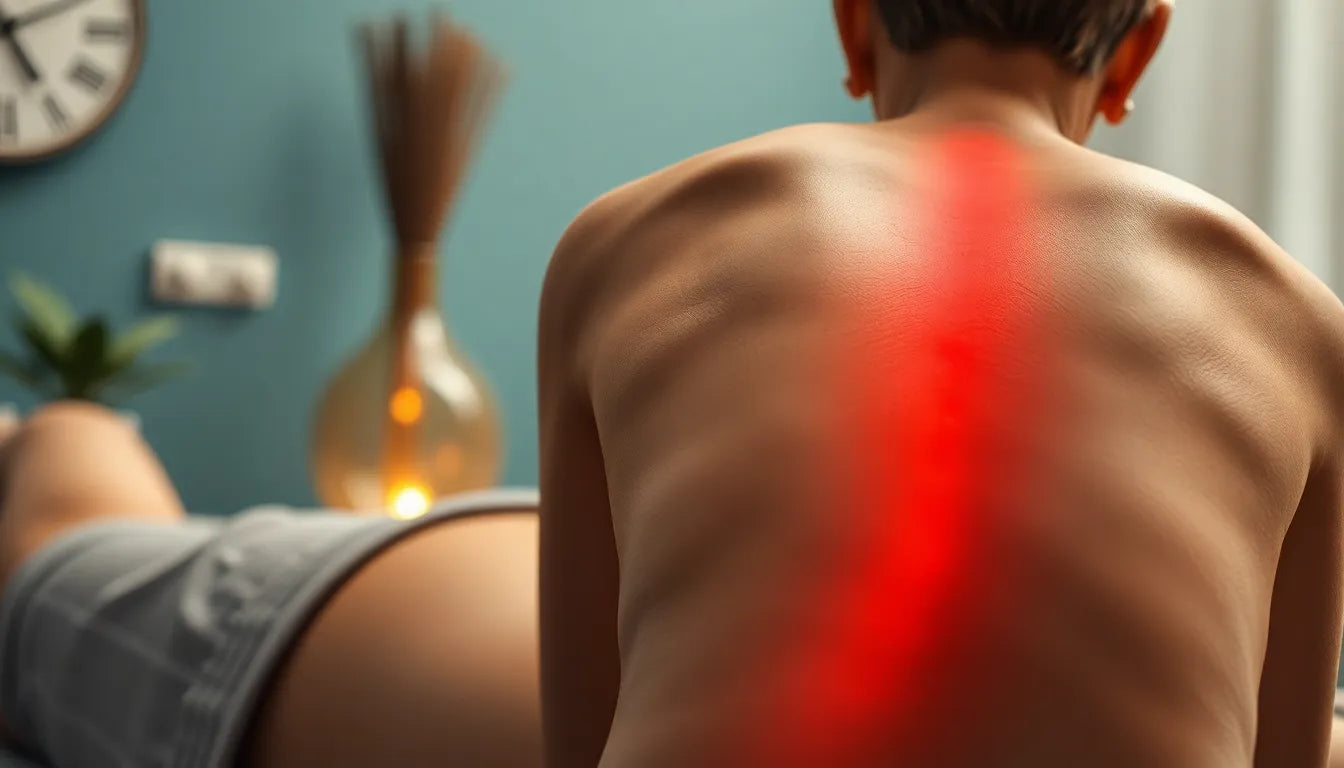Back pain is a common ailment that many people attribute to physical strain, poor posture, or injury. However, there might be an unexpected factor contributing to your discomfort: gluten. This protein, found in wheat, barley, and rye, is often associated with digestive issues, but recent discussions suggest it might also play a role in causing back pain.
Back pain affects millions worldwide and can stem from various causes such as muscle strain, herniated discs, or arthritis. These conditions are well-documented and understood, but the notion that dietary factors like gluten could contribute is gaining attention. People with celiac disease or gluten sensitivity often experience a range of symptoms beyond the gut, including joint and muscle pain, which could explain a potential link to back discomfort.
exploring the gluten-back pain connection
As awareness of gluten-related disorders grows, so does the interest in how they might affect different parts of the body, including the back. Celiac disease is an autoimmune condition where gluten consumption triggers an immune response that damages the small intestine. This can lead to various symptoms, including those affecting muscles and joints. Similarly, non-celiac gluten sensitivity, although not an autoimmune disease, can still cause systemic inflammation that may manifest as back pain.
The purpose of this post is to delve into the possible connection between gluten and back pain. Understanding all potential contributors to back pain is crucial for effective management, especially for those who have not found relief through traditional treatments. By exploring this emerging area, we aim to provide insights that could lead to better pain management strategies and improved quality of life for those affected.
Stay with us as we uncover more about the relationship between gluten and back pain, examining medical observations, mechanisms, and expert recommendations. Whether you're dealing with chronic back pain or just curious about the potential dietary influences, this exploration could offer valuable perspectives and practical advice.
medical observations on gluten and back pain
Traditionally, back pain has been attributed to mechanical issues such as muscle strain, herniated discs, and arthritis. However, emerging evidence suggests that gluten might play a role in causing or exacerbating back pain, particularly in individuals with celiac disease or gluten sensitivity. Medical professionals have observed that some patients report significant improvements in their symptoms after adopting a gluten-free diet. In fact, studies have shown that up to 80% of individuals with unexplained back pain experience relief upon eliminating gluten from their diet.
Case reports and anecdotal evidence further support the notion that gluten intolerance can contribute to back pain. For instance, individuals with celiac disease often experience extraintestinal symptoms, including muscle and joint pain, which can manifest as back discomfort. Similarly, those with non-celiac gluten sensitivity might suffer from systemic inflammation that impacts the back and other parts of the body.
understanding the mechanisms
The exact mechanisms by which gluten might cause back pain are not yet fully understood, but several theories exist. One possibility is that gluten triggers an immune response that affects the linings of joints, leading to inflammation and pain. This immune response might also cause generalized inflammation that starts in the gut and spreads throughout the body, potentially affecting the back.
Another hypothesis is that gluten could trigger autoimmune reactions in some individuals, leading to systemic effects that include back pain. While these theories offer plausible explanations, more research is needed to clarify the connection between gluten and back pain and to understand the underlying biological processes involved.
symptoms beyond the gut
For those with celiac disease, the symptoms extend beyond the digestive system. Muscle and joint pain, including back pain, are recognized as extraintestinal manifestations of the condition. Other symptoms that may accompany gluten-related issues include fatigue, anemia, and bone density loss. These symptoms can significantly impact an individual's quality of life and may contribute to chronic pain conditions.
expert recommendations
Experts advise that individuals experiencing chronic or unexplained back pain, particularly if accompanied by digestive symptoms, consider testing for celiac disease. A proper diagnosis is crucial before making dietary changes, as a gluten-free diet can be challenging to maintain and may lead to nutritional deficiencies if not carefully managed.
For those who suspect gluten sensitivity but do not have a celiac diagnosis, experts recommend a trial gluten-free diet to observe any improvements in symptoms. It is important to approach this cautiously and under the guidance of a healthcare professional to ensure that nutritional needs are met and to avoid unnecessary dietary restrictions.
In conclusion, while traditional causes of back pain remain prevalent, the potential link between gluten and back pain is gaining attention. Understanding the role of gluten in back pain can lead to more effective management strategies for those affected. By considering dietary factors alongside other treatments, individuals may find relief and improve their overall quality of life.
real stories and case studies
Many individuals have found relief from back pain by making dietary changes, particularly those involving gluten elimination. For instance, stories from platforms like Dinryg.dk highlight cases where people experienced significant improvements in their back pain after adopting a gluten-free diet. These real-life examples underscore the potential impact of dietary interventions on managing back pain, especially for those with gluten sensitivity or celiac disease.
One such story involves a patient who suffered from chronic back pain for years without finding relief through traditional treatments. After consulting with a healthcare professional and undergoing tests, it was suggested that they try a gluten-free diet. Within weeks, they reported a marked decrease in back pain, attributing the improvement to the removal of gluten from their diet. This case, among others, emphasizes the importance of personalized approaches in addressing back pain.
a holistic approach to managing back pain
Managing back pain effectively often requires a multifaceted approach. While dietary changes can play a crucial role, integrating them with physical interventions can enhance outcomes. Ergonomic tools, physiotherapy, and regular exercise are essential components of a comprehensive pain management strategy.

Lumbar support belt
Adjustable belt to support and relieve lower back pain in daily life.
Anodyne offers a range of ergonomic solutions designed to alleviate back pain and improve posture. These products can be particularly beneficial when combined with dietary adjustments, providing a holistic approach to managing discomfort. By addressing both physical and dietary factors, individuals can achieve more sustainable relief from back pain.

Men's Posture Shirt™ - Black
Patented shirt designed to improve posture and help reduce back pain.
frequently asked questions
Can gluten really cause back pain?
Current evidence suggests that gluten can indeed contribute to back pain, particularly in individuals with celiac disease or non-celiac gluten sensitivity. While the link is not fully understood, many report symptom improvement after eliminating gluten from their diet.
How do I know if my back pain is related to gluten?
If you experience back pain alongside digestive symptoms or other signs of gluten sensitivity, it's worth consulting with a healthcare professional. Testing for celiac disease or trying a gluten-free diet under medical supervision can help determine if gluten is a contributing factor.
What are the first steps if I suspect gluten is the culprit?
Begin by consulting with a healthcare provider who can guide you through testing for celiac disease. If diagnosed, a gluten-free diet is essential. For those with suspected gluten sensitivity, a trial period without gluten, monitored by a professional, can help assess its impact on your symptoms.
Which ergonomic products can help with back pain, regardless of its underlying cause?
Ergonomic chairs, adjustable desks, and supportive cushions are effective tools for managing back pain. These products help maintain proper posture and reduce strain on the back, providing relief alongside any dietary changes you may undertake.
Kilder
- The Celiac MD. "Back Pain and Gluten."
- Din Ryg. "Rygsmerter og Glutenallergi."
- Coeliaki Foreningen. "Hvad sker der hvis jeg spiser noget med gluten?"
- Kjeld Adam. "Rygsmerter."
- Din Ryg. "Stivhed i Lænden."
- Smertefri Bevægelse. "Spis dig fra dine smerter."
- Sundhed RM. "8 Myter om Gluten og Glutenintolerance."
- Sundhedsstyrelsen. "Giver din ryg dig smerter i benet?"


















